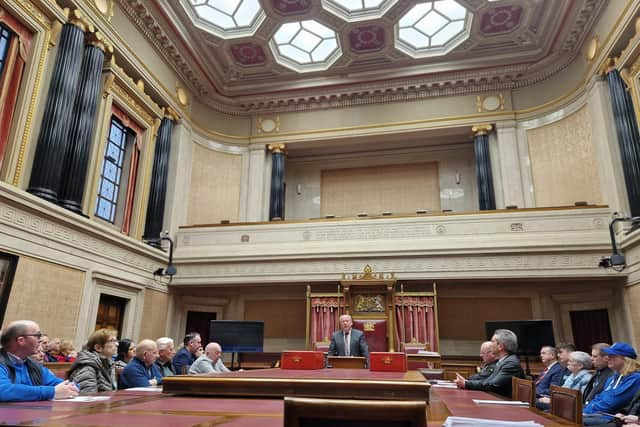Standing room only and utter silence as survivors of terror attacks relive their experiences on annual European victims day at Stormont
and live on Freeview channel 276
Five people whose lives have been altered by paramilitary attacks – either upon them or on family members – stood up to speak about how the events unfolded as part of European Remembrance Day for Victims of Terrorism.
The gathering has become part of a tradition at Stormont, hosted each year since 2012 by TUV leader Jim Allister.
Advertisement
Hide AdAdvertisement
Hide AdThe event originated in 2004 in the EU, originally to mark the victims of the Madrid train bombings that year, when Al Qaeda killed 193 people.


This year among the speakers was Peter Heathwood, who was shot by loyalists in north Belfast in 1979.
Upon coming upon the scene, his father died of a heart attack.
Mr Heathwood himself was left in a wheelchair.
He remembered two of his children, six and four, playing in the hallway as he looked after his three-month-old. The doorbell rang.
Advertisement
Hide AdAdvertisement
Hide AdThere were shouts of “gunmen! gunmen!” followed by commotion as they barged in, then “boom, boom, boom, boom” and the sensation of the lead flying through his body – followed by the realisation his legs didn’t work.
He told the meeting of the lasting effect it had on his family, saying that his wife Anne became prone to fits of “binge drinking”.
“Something would come on the news and Anne would go up to her room with a bottle of vodka or two,” he said, and they would keep their children downstairs to shield them.
In 2006, he found her dead in bed.
“Losing Anne was worse than using the use of my legs,” he said.
“For two years I became a recluse.”
Advertisement
Hide AdAdvertisement
Hide AdShe “blamed herself to the end” – all because, on the night in question, she had been the one who answered the door.
In a further “ripple effect”, his daughter said that well into adulthood she would freeze every time she saw a man wearing a hoodie.
“The damage done to this society is not just the 3,700 dead and 40,000 injured,” said Mr Heathwood, via a video message.
“People had heart attacks, took their own lives, people who died of other side-effects, aren't counted as victims of the Troubles – but they are.”
Advertisement
Hide AdAdvertisement
Hide AdMr Allister said that those who “tell us there was some glamour or justification for terrorism” should be “forced to watch” his testimony.
He said the accounts which people had given serve as a reminder that the crimes of the Troubles are “something we can never regularise or justify”.
“I think in this society there's too much focus on the victim makers and not enough thought of the victims,” he said.
“If this annual event does nothing other than, for one day, put the focus on the victims and expose the horror and needless actions of the victim-makers, then this event will have well served its purpose.”
Advertisement
Hide AdAdvertisement
Hide AdAlso speaking was Michael Bingham, the grandson of William Herron.
William, his wife Elizabeth and daughter Noeline were killed by the IRA in 1976 when the building they were in (a top-floor flat above some shops) was firebombed in Dromore, Co Down.
He recounted how a “terrible inferno” engulfed the building, and from the ground William could be seen trapped inside.
This was “the last physical memory my mum had of her father, her mother, and her sister”.
Advertisement
Hide AdAdvertisement
Hide AdTwo women and man were given decades-long jail sentences, but the two women were freed with a royal pardon in 1985 – something “deeply insulting to our family”.
“Healing is much more difficult,” Mr Bingham added, “when truth and justice are corrupted.”
Also speaking was David Evans, an off-duty UDR soldier, who was ambushed by republican gunmen in 1984 near Bellaghy, south east Co Londonderry.
Some eight years earlier his brother, RUC constable Clifford Evans, had been killed in a similar ambush near Toome.
Advertisement
Hide AdAdvertisement
Hide AdHe tried to drive on, away from his would-be killers, but was floating on the edge of unconsciousness.
He pulled over and applied a tourniquet to one of his wounded legs to stem the blood, and put his gun on the seat beside him in case the attackers caught up with him.
He told the meeting of the long string of medical procedures and infections that followed.
“But I am eternally gratefuI I survived to see my children grow up, and meet my grandchildren, when so many of my friends and colleagues never got that chance,” he said.